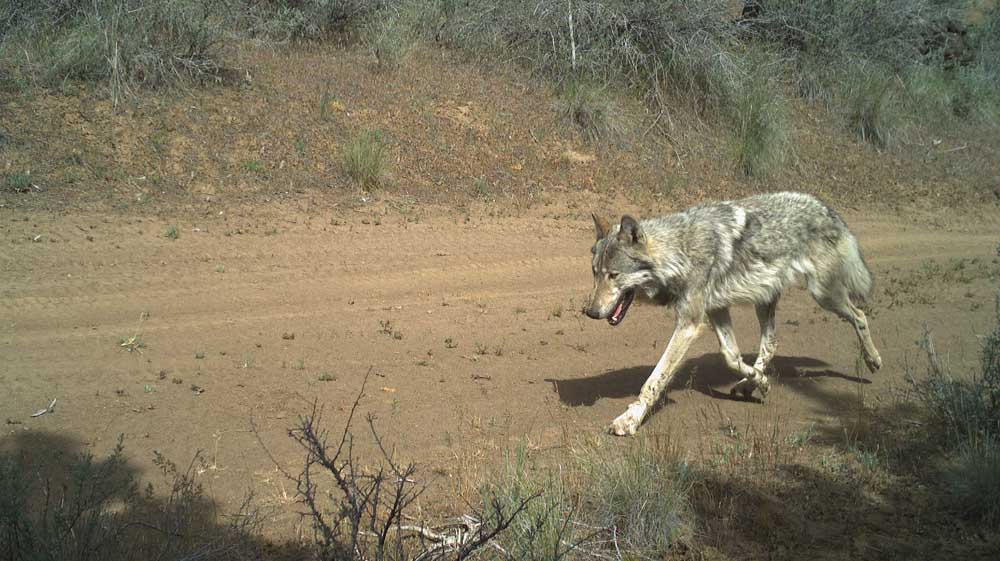Deschutes County moves to prevent wolf attacks east of Bend
Published 12:41 pm Thursday, February 20, 2025

- A wolf from the Metolius Pack trots past a trail camera in May 2022 on U.S. Forest Service land in Jefferson County. Wolves have more recently been observed in eastern Deschutes County.
Deschutes County will ask the state of Oregon for $132,800 to support projects that protect ranchers from wolf attacks. The county request was unanimously approved at a Deschutes County Commission meeting Wednesday.
The funding ask was made by the Deschutes County Wolf Committee, which met on Feb. 11 to discuss funding applications from three local ranches.
The grant requests were for non-lethal preventative measures to reduce conflict between wolves and livestock. The grants are offered by the Oregon Department of Agriculture and passed through county wolf committees.
Wolf attacks on livestock are an increasing problem for ranchers across the state. Coexisting with wolves can require ranchers to invest in expensive monitoring systems and labor needed to patrol for wolves.
The requests for funds by ranchers are for preventative measures to deter future attacks. The requests include $81,000 from the McCormack Ranch, $16,800 for Hatfield Hyde Land Trust and $5,000 for Desert Creek Land, Cattle, & Timber Co.
Aaron Bott, a wolf biologist with Oregon Department of Fish and Wildlife, says there is evidence of wolves using eastern Deschutes County as a travel corridor.
Collared wolves monitored by Oregon Department of Fish and Wildlife have spent time recently near the McCormack Ranch near Brothers, including the wolf known as OR 158.
This wolf, which recently reach sexual maturity, traveled to California and returned to the McCormack Ranch area within a week, Bott said. ODFW believes OR 158 is searching for a mate.
The Metolius Pack, which roams parts of western Deschutes County, has a breeding pair and three pups, now considered to be fully grown. North of the Metolius Pack is the Warm Springs Pack, which has been known to go through Deschutes County.
Ryan Kingsbury, ranch manager of McCormack Ranch, describes the presence of wolves on his cattle ranch as “extremely escalated since the fall of last year.”
“OR 158 (collared wolf) has been the biggest issue. He decided to frequent our operation often fall through winter of 2024. During this timeline we have been visited by others as well,” said Kingsbury.
“At least two other individuals spent time with us as well as a pack of four wolves that decided to take a tour. During this short period our ranch sustained three confirmed depredations and out of my own speculation a couple more that we were late in discovering that could not be proven,” he said.
McCormack Ranch straddles both Deschutes and Crook counties. The depredations occurred on the Crook County side.
In addition to applying for grants for ranchers, the county is also requesting $30,000 in funds to pay for preventative measure tools. The total ask from the state is $132,800. If the board approves the request the applications to the state will be submitted by early March, with a response expected in late March.
Typical ways to prevent attacks including guard dogs, night penning, lighting and fladry (hanging brightly colored flags on wire). Fox lights — flashing light systems — are another investment that helps repel wolves. Removing the carcasses of dead cows is also important as they tend to attract wolves. Having a human presence on the landscape, in the form of range riders, is considered to be the most effective deterrent to wolves.
Confirmed depredations in Deschutes County occurred in 2023 but none were reported during 2024. Deschutes County Commissioner Phil Chang said the lack of depredations indicate successful work conducted by the county to prevent attacks.
“Preventative measures pursued by livestock producers in western Deschutes County, and funded by the state program, are working,” he said, adding that the focus now shifts to areas in eastern Deschutes County.
“There is significant wolf activity in this area and there have been recent depredations and missing animals in southern Crook County in the last year,” said Chang.








